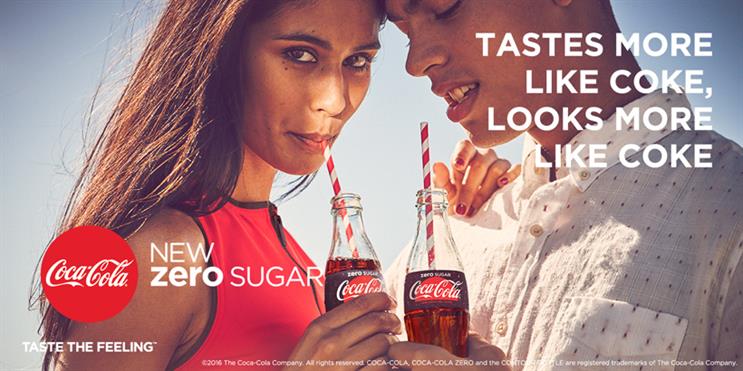
Zero Sugar is designed to taste indistinguishable from classic Coke, and has a name chosen in the hope that it will scream its sugar-free credentials from the rooftops.
"The only real mistake we made with Coke Zero was to call it that, and not Coke Zero Sugar," says Brittain. "The big consumer learning has been that even among drinkers, the awareness of its zero sugar status was not high enough."
Coke is not taking any chances this time – it’s running its biggest ever sampling campaign, with four million free drinks given away.
A five-metre tall replica of the Zero Sugar glass bottle is going on tour of the UK while in London, people will this weekend have the chance to visit the "Coca-Cola Zero Sugar taste lounge" and sample the product in a multi-sensory environment.
And there’s no ambiguity in the launch TV spot, which promises: "Tastes more like Coke. Looks more like Coke." Brittain says that despite the direct attribute-based messaging, this is very much a continuation of the "Taste the feeling" campaign that unites the four Coca-Cola brands: classic, Diet, Zero Sugar and Life. "It’s very much about brand executions, reinforcing the brand and product promise," he says.
The bottom line
Coke has an interest in getting consumers to love its low- and no-sugar colas for several interconnected reasons. Given the public conversation around sugar consumption, it has no desire to be a pariah, but it also risks losing customers that want to cut down on sugar, if they don’t know which other options are available.
This is the key consideration informing this week’s launch, says Brittain: "We’re a business and have a responsibility to drive the greatest shareholder return possible, and the way that we’re going to do that is by making consumers aware of the choices available to them.
"A healthy portfolio of the Coca-Cola trademark in all manifestations is the surest way of ensuring that bottom line. We are paying the maximum compliment possible to Coca-Cola classic here, because we’re using that as the point of reference for the new product."
And then there’s the looming "sugar tax" (soft drinks levy, to give it its proper name), announced by Chancellor George Osborne in March’s budget, which has the potential to seriously wound that bottom line.
For drinks with more than 8g of sugar per 100ml – which includes classic Coke, alongside rivals like classic Pepsi and Irn-Bru – the current proposals are for manufacturers to be charged 24p per litre packaged for sale. That's 48p per 2l bottle they either need to add to the retail price, or take on the chin.
The sugar-free Diet Coke and Zero Sugar, will be exempt, however, while mid-calorie Coke Life will be taxed at a lower rate. Given that classic Coke makes up 57% of all Coca-Cola sales, it’s no wonder the business is keen to get soda drinkers switching over.
Brittain says that in terms of outcomes, he’s "completely aligned with the government" on the issue of child obesity – but reiterates the opposition to the tax expressed already by Coke’s UK general manager Jon Woods and other industry leaders: "There are very few countries around the world, if any, that would now point to a sugar tax being an effective means to reduce childhood, or indeed any obesity."
Be a good caretaker
There’s one thing that Brittain is adamant about: classic Coke is never going to become a niche product in the range.
"I’m a Coca-Cola classic loyalist – I drink it every single day, so I’m coming from a rather biased position, but it’s really important we have a reference point that’s known and loved by all our consumers," he says.
Brittain’s attitude to the brand is that it is his job to create the conditions in which it will not only survive, but prosper. "We’ve been around for 130 years; the stewardship of this brand dictates that we all leave it in better shape than we found it," he says. "That is our internal objective and everything we do is designed to improve the legacy, the overall standing of the trademark.
"Innovation – not just in terms of product and packaging, but also things like the ways we derive insights from consumers – that’s a critical enabler of the brand’s overall standing."
Elsewhere in the marketing strategy, the brand has recently launched a UK version of YouTube channel CokeTV, which offers content around gaming, music and sport and is fronted by popular vloggers Emmanuel "Manny" Brown and Dodie Clark.
Is this a game of catch up with Pepsi Max, which has one of the most popular Youtube channels of any FMCG brand in the UK, and has used that exposure to drive big sales growth and lead the way among sugar-free colas? Absolutely not, says Brittain – it’s just an acknowledgement that a diverse strategy pays.
"The evidence of things like Share a Coke over the last few years, is that they absolutely captured their [younger Millennials’] imagination and dare I say their purchasing decisions too. We have a track record of continuous success of engaging with teens.
"CokeTV is another iteration, another proof point. It does highlight that you’ve got to fish where the fish are, and that includes Youtube. But there’s more than one way to skin that particular cat; we still think paid for advertising is an important way of talking to that audience."




.jpg)
.jpeg)
